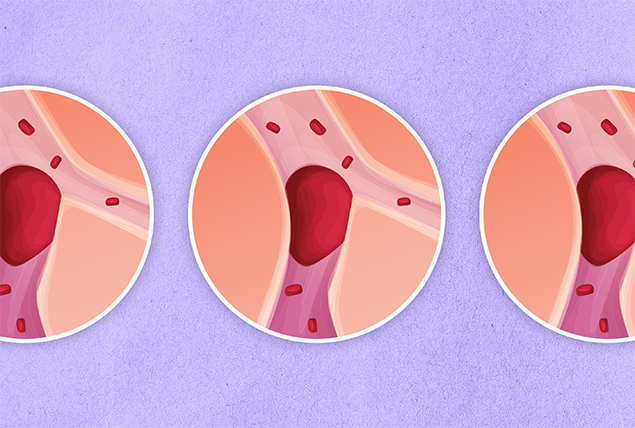Can You Get a Blood Clot in Your Penis?

A man in his 40s came to urologist Lael Stieglitz, M.D., with a palpable, spaghetti-like cord on the top of his penis.
"It wasn't super painful," Stieglitz said. "It was just weird because he felt basically a mass in his penis."
An ultrasound revealed it to be a blood clot in a vein in his penis. Stieglitz put the man on full-dose aspirin and told him to apply a hot compress, such as soaking in a bath or applying a warm washcloth, in 10-minute intervals. The heat would help increase blood flow and break up the clot.
"Over time, the body dissolves it and it goes away," Stieglitz said.
This man's penile blood clot took about six weeks to resolve.
Penile blood clots are not common
Blood clots in the penis are rare. That's the only case Stieglitz has seen in the three years she's been in practice at Baptist MD Anderson Cancer Center in Jacksonville, Florida.
Neel Parekh, M.D., a men's fertility and sexual health specialist with Cleveland Clinic, said he's only seen about five cases in the last five years.
"The good news is it's usually self-limiting," Parekh said. "It usually goes away on its own."
The medical terms for a blood clot in the penis are penile Mondor's disease and thrombophlebitis (Latin for "inflammation of a vein"). The dorsal vein, the largest vein in the penis located near the skin, is most commonly affected. However, all veins in the penis have the potential to clot.
The pain from the clot varies by patient. For many people, it's a consistent dull ache.
"For some, it's only with sexual activity," Parekh said. "For others, it's more constant. It's hard to say. There's more discomfort when it's erect."
What causes a blood clot in your penis?
One known cause of a blood clot in the penis is trauma, which could be from a vigorous masturbatory technique or rough sex.
It creates some kind of reaction that's an irritation, and it is usually in the superficial dorsal vein," according to Seth Cohen, M.D., an assistant professor of urology and the director of sexual medicine at NYU Langone Health in New York.
"What can happen is it starts to thicken and get hard," Cohen said, adding that on a physical exam, the clot often feels similar to a tiny plastic stirring straw. "It can sometimes go from the base all the way to the tip of the penis. It's painful to touch. It's painful when they're flaccid and when they're erect. This is usually what brings men into the office."
While a majority of blood clots in the penis are due to trauma, Parekh said, he's heard of blood clots in the penis being linked to infections or, very rarely, penile cancer. Sometimes, the penile blood clot is idiopathic, meaning the cause is unknown.
Both Parekh and Cohen said their patients with penile blood clots have usually been younger men.
"I don't know if it has a predisposition to young guys," Parekh said. "I don't think so. Maybe it's because the younger guys are having more vigorous sex that puts them at a higher risk."
Diagnosis of a blood clot in the penis is typically performed with a physical exam, although a penile ultrasound is sometimes used for confirmation.
Prognosis and treatment of a blood clot in the penis
Fortunately, a blood clot in the penis does not generally lead to any long-term complications. They're not associated with erectile dysfunction (ED), but painful blood clots in the penis tend to cause men to avoid sexual activity.
"They don't feel comfortable, so they don't want erections," Cohen said. "They tend to steer away from it because they try it once or twice, then they notice that the pain is even worse with the erection."
Cohen said he's not aware of any data suggesting there's a long-term link with any blood diseases. It's almost always a short-lived phenomenon.
"You would think it sounds bad, like a blood clot in the leg, but actually, you have so many veins in the penis that nothing really bad happens," Cohen said.
The clot doesn't shut off blood flow to the penis.
"It's just that one [dorsal] vein," Cohen said. "All the other hundreds of veins will stay open, so there's no blood flow problem. It's still quite uncomfortable."
Nonsteroidal anti-inflammatories (NSAIDs), such as ibuprofen and naproxen, are typically the first-line treatments. If the patient doesn't respond to NSAIDs, Cohen may try a steroid, such as a Medrol Dosepak, to bring the swelling down. Surgical removal of the affected dorsal vein is rare.
Parekh said he advises his patients to avoid sexual activity for a couple of weeks as the vein heals. Penile blood clots typically resolve within three to six months, he said.
"I might have them take an anti-inflammatory scheduled for a week and then just as needed prior to sexual activity," Parekh said. "A lot of guys just let it go away on its own."
If you think you may have a blood clot in your penis, consider scheduling an appointment with a urologist.
"My take-home message is: Any sort of lump or bump in your penis, you should get it looked at," Stieglitz said. "Don't just go to Google."


















